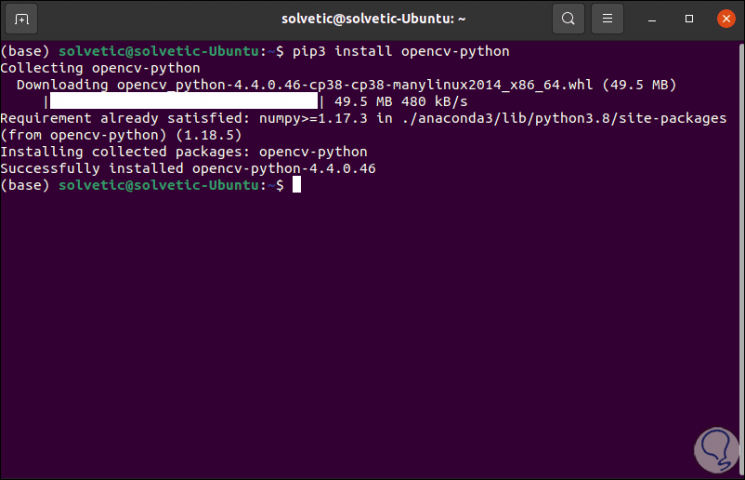

- #SUDO APT UPDATE PYTHON INSTALL#
- #SUDO APT UPDATE PYTHON UPGRADE#
- #SUDO APT UPDATE PYTHON FULL#
- #SUDO APT UPDATE PYTHON SOFTWARE#
- #SUDO APT UPDATE PYTHON DOWNLOAD#
I am using HA on ubuntu 18.04 installed in a virtual environment as user ‘homeassistant’.
#SUDO APT UPDATE PYTHON INSTALL#
Pip install -upgrade pip (not sure if needed?) Sudo chown homeassistant:homeassistant homeassistant (might not be needed, depends on path to previous install?) Sudo mkdir homeassistant (might not be needed, depends on path to previous install?)
#SUDO APT UPDATE PYTHON UPGRADE#
When I did my initial install, what folder do I need to backup (mv) to be safe?Īlso, I think that this is what I’d do to upgrade if I’m running VENV as another user sudo apt update So If I did this sudo -u homeassistant -H -s So, if I generally follow your instructions I will have to do some steps as the Home Assistant User, right? I did my install about a year ago using these instructions
#SUDO APT UPDATE PYTHON DOWNLOAD#
I can install, download updates, follow instructions, etc. As comfortable as I generally feel in HA, I don’t feel as comfortable in unix.


Looks like I’m going to need to upgrade as well. So, for now, you will need to install it manually: pip install home-assistant-frontend If you don’t use mysql you don’t need to install it.įinally, it is currently some bug causing missing frontend package. In my example, as you can see, I am installing mysqlclient. You will need to install any additional packages you are using. So my virtual environment located in /home/ha/homeassistant You, of cause, will need to replace my path by yours.Ĭhange directory to one level above your current virtual environment cd /home/haīackup existing installation to be able to go back if something goes wrong mv homeassistant homeassistant_bkpĬreate a new virtual environment python3.7 -m venv homeassistant I am originally I installed virtual environment in /home/ha like this: python3 -m venv homeassistant Sudo add-apt-repository ppa:deadsnakes/ppa Sudo apt install software-properties-common Just upgraded python to 3.7 and want to share my experienceįirst thing you need to install python 3.7 sudo apt update org/installing/įor nightly builds, see ppa:deadsnakes/ nightly https:/ /launchpad.So I have a home assistant installed in a virtual environment.

For an introduction into the Python packaging ecosystem and its tools, refer to the Python Packaging User Guide: To install 3rd-party Python modules, you should use the common Python packaging tools. As an exception, pure-Python modules for Python 3 will work, but any compiled extension modules won't. Accordingly, they generally won't work with the Python interpreters from this PPA. Python modules in the official Ubuntu repositories are packaged to work with the Python interpreters from the official repositories. `python#.#-tk`: provides the standard library `tkinter` module `python#.#-gdbm`: provides the standard library `dbm.gnu` module #-lib2to3` : provides the `2to3-#.#` utility as well as the standard library `lib2to3` module #-distutils` : provides the standard library `distutils` module `python#.#-venv`: provides the standard library `venv` module `python#.#-dev`: includes development headers for building C extensions Here is a list of packages that may be useful along with the default install:
#SUDO APT UPDATE PYTHON FULL#
As such, the packages follow debian's patterns and often do not include a full python distribution with just `apt install python#.#`. The packages provided here are loosely based on the debian upstream packages with some modifications to make them more usable as non-default pythons and on ubuntu. The packages may also work on other versions of Ubuntu or Debian, but that is not tested or supported. If you need these, reach out to asottile to set up a private ppa Note: for jammy, older python versions requre libssl<3 so they are not currently built So, according to your Linux system run the system update command first. Some major, very- and incompatibly-different versions get their own packages.
#SUDO APT UPDATE PYTHON SOFTWARE#
But with some software (among which is Python) the situation is somewhat different. Note: for focal, older python versions require libssl<1.1 so they are not currently built Step 1: Update your Linux To follow this tutorial you must be on a Linux system like Ubuntu, CentOS, Alamlinux Amazon Linux, or any other. As others already noted, bare sudo apt-get install package will install latest available version, replacing the older one if needed. Note: Python2.7 (all), Python 3.8 (focal), Python 3.10 (jammy) are not provided by deadsnakes as upstream ubuntu provides those packages. Issues can be reported in the master issue tracker at: Please use this repository instead of ppa:fkrull/ deadsnakes. If you want to use them in a security- or-otherwise- critical environment (say, on a production server), you do so at your own risk. This PPA contains more recent Python versions packaged for Ubuntu.ĭisclaimer: there's no guarantee of timely updates in case of security problems or other issues.


 0 kommentar(er)
0 kommentar(er)
